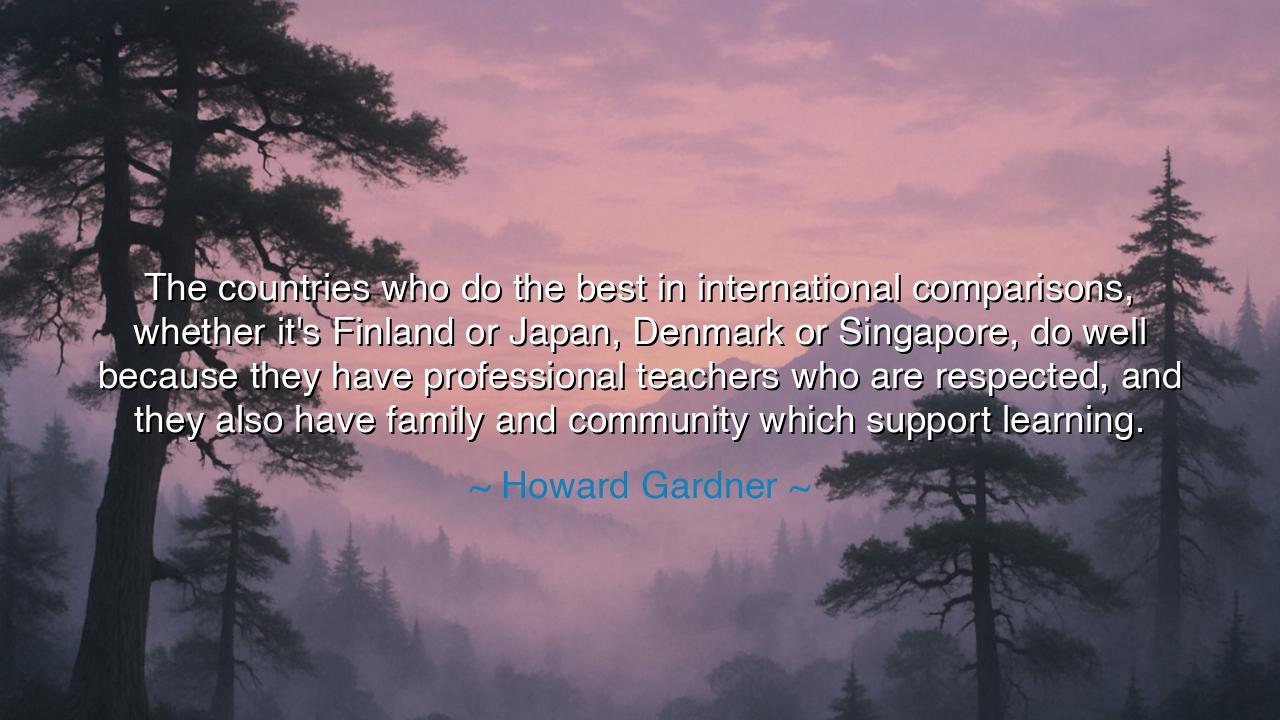
The countries who do the best in international comparisons
The countries who do the best in international comparisons, whether it's Finland or Japan, Denmark or Singapore, do well because they have professional teachers who are respected, and they also have family and community which support learning.






When Howard Gardner proclaimed, “The countries who do the best in international comparisons, whether it’s Finland or Japan, Denmark or Singapore, do well because they have professional teachers who are respected, and they also have family and community which support learning,” he was not merely speaking of education — he was speaking of civilization itself. His words rise beyond the classroom and touch upon the very foundations of human progress, reminding us that the strength of a nation does not lie in its wealth or armies, but in its devotion to learning. For Gardner, the true measure of greatness is not in monuments or machines, but in the minds and hearts a society cultivates through respect, unity, and shared purpose.
The origin of this wisdom lies in Gardner’s lifelong study of the human mind — as the scholar who gifted the world the theory of Multiple Intelligences, he has spent decades observing how people learn, grow, and thrive. In this reflection, he draws from the examples of nations that have made education their crown jewel: Finland, where teachers are revered as nation-builders; Japan, where discipline and collective responsibility shape the spirit of the learner; Denmark, where trust and creativity flow through schools like sunlight; and Singapore, where excellence in teaching is treated as a sacred calling. These nations have understood a truth as old as time: that education is the heartbeat of progress, and the teacher is its pulse.
To the ancients, Gardner’s insight would have been a familiar refrain. In Greece, Plato declared that the highest duty of the state was to shape the character of its citizens through education. In China, Confucius taught that a nation’s harmony depends on the virtue of its teachers and the diligence of its students. Across civilizations, the teacher was not a laborer of lessons but a keeper of light — one who passed the fire of wisdom from one generation to the next. Gardner’s words revive this ancient truth for the modern age: that learning cannot flourish where teachers are undervalued, nor can it endure where families and communities do not uphold it as sacred.
History offers luminous examples of this harmony between teacher, family, and society. Consider Finland, a nation that transformed itself from a struggling postwar country into one of the world’s most educated and innovative societies. How? By placing trust in its teachers. In Finland, educators are trained like physicians — their preparation is long, rigorous, and honored. They are not mere transmitters of facts, but architects of curiosity. Parents and communities, too, play their part: reading with their children, engaging in school life, treating learning as a collective journey rather than an individual task. This partnership between teacher, home, and society is the true secret of success, not wealth or policy alone.
In contrast, Gardner’s words also stand as a warning. Where teachers are ignored, where families are disengaged, where communities no longer believe in the sacredness of learning, the flame of civilization flickers and fades. The Roman Empire, in its decline, neglected the arts of the mind and turned its gaze toward spectacle and power. The result was not only moral decay but intellectual stagnation. When a society stops respecting its teachers, it begins to forget its own future. Education is not an expense to be endured — it is an inheritance to be cherished. Without it, even the mightiest nations crumble into shadows of what they once were.
Yet Gardner’s message is not one of despair, but of hope and revival. He reminds us that the path to renewal is clear and within reach. It begins with honor — honoring those who teach, who shape, who guide. It begins with community, with families who make learning a shared value, not a chore. It begins with trust, for teachers flourish only when they are trusted to lead with wisdom rather than bound by bureaucracy. When these three pillars stand firm — teacher, family, and society — the nation itself becomes a living classroom, and every citizen a lifelong learner.
The lesson in Gardner’s words, then, is this: education is a sacred covenant between generations. It is not the work of schools alone, but of an entire people who believe in the power of knowledge to elevate the human spirit. Each of us — whether parent, student, leader, or worker — bears a part of this sacred duty. To support a teacher is to build a bridge to the future; to nurture a child’s curiosity is to plant the seeds of eternity.
So, my children, take this teaching to heart: revere your teachers, for they are the silent builders of your destiny. Strengthen your families, for they are the soil in which learning grows. Uplift your communities, for they are the guardians of your shared wisdom. As Gardner reminds us, when the teacher is honored, when the family is engaged, when society cherishes learning as its highest virtue — then the nation will stand not only rich in knowledge, but radiant in soul. And such a nation, guided by wisdom and bound by respect, shall endure through every storm and shine across the ages.






AAdministratorAdministrator
Welcome, honored guests. Please leave a comment, we will respond soon